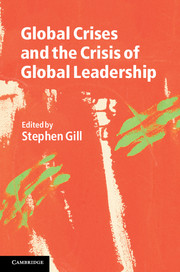Crossref Citations
This Book has been
cited by the following publications. This list is generated based on data provided by Crossref.
2012.
Books Received.
Review of Radical Political Economics,
Vol. 44,
Issue. 1,
p.
124.
2015.
Health and Health Care in South Africa.
New England Journal of Medicine,
Vol. 372,
Issue. 1,
p.
95.
Gill, Stephen
and
Benatar, Solomon R.
2016.
History, Structure and Agency in Global Health Governance Comment on "Global Health Governance Challenges 2016 – Are We Ready?".
International Journal of Health Policy and Management,
Vol. 6,
Issue. 4,
p.
237.
Baillat, Alice
Emprin, Fabien
and
Ramel, Frédéric
2016.
Méthodes de recherche en relations internationales.
p.
227.
Benatar, Solomon
2016.
Politics, Power, Poverty and Global Health: Systems and Frames.
International Journal of Health Policy and Management,
Vol. 5,
Issue. 10,
p.
599.
Benatar, Solomon R.
2017.
"Not Everything That Is Faced Can Be Changed, but Nothing Can Be Changed Until It Is Faced": A Response to Recent Commentaries.
International Journal of Health Policy and Management,
Vol. 6,
Issue. 7,
p.
423.
CEPEDA-MÁSMELA, Carolina
2018.
Resistencias contra el neoliberalismo: una conceptualización de su ejercicio entre lo local y lo global.
Relaciones Internacionales,
p.
59.
Benatar, Solomon
and
Daneman, Denis
2020.
Disconnections between medical education and medical practice: A neglected dilemma.
Global Public Health,
Vol. 15,
Issue. 9,
p.
1292.
Benatar, Solomon
Upshur, Ross
and
Gill, Stephen
2021.
Global Health.
p.
230.
Benatar, Solomon
and
Brock, Gillian
2021.
Global Health.
Farazmand, Ali
and
Danaeefard, Hasan
2021.
Iranian Government’s Responses to the Coronavirus Pandemic (COVID-19): An Empirical Analysis.
International Journal of Public Administration,
Vol. 44,
Issue. 11-12,
p.
931.
Davvetas, Vasileios
Ulqinaku, Aulona
and
Abi, Gülen Sarial
2022.
Local Impact of Global Crises, Institutional Trust, and Consumer Well-Being: Evidence from the COVID-19 Pandemic.
Journal of International Marketing,
Vol. 30,
Issue. 2,
p.
73.
Benatar, Solomon R.
2022.
Health in a post-COVID-19 world.
South African Journal of Science,
Vol. 118,
Issue. 11/12,
Parmar, Inderjeet
and
Furse, Thomas
2023.
The Trump administration, the far-right and world politics.
Globalizations,
Vol. 20,
Issue. 5,
p.
799.
Girardi, Gabriele
and
Rubim Sarate, João Alberto
2023.
Is it possible to identify transformational leadership in a financial institution?.
Revista de Gestão,
Vol. 30,
Issue. 2,
p.
133.
Maechler, Sylvain
and
Graz, Jean-Christophe
2024.
Uncertainty in times of ecological crisis: a Knightian tale of how to face future states of the world.
European Journal of International Relations,
Yukaruç, Umut
2024.
Democracy Promotion and Public Diplomacy: US Efforts to Communicate with the Peoples of the Middle East in the Early Years of the 21st Century.
Uluslararası İlişkiler ve Diplomasi,
Vol. 7,
Issue. 1,
p.
53.



